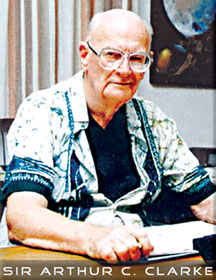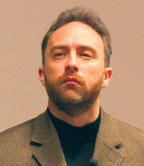
Sir Arthur C. Clarke: Man who led the Space Odyssey'
Author of a number of world acclaimed science fiction books,
British-born Arthur C. Clarke is a household name in Sri Lanka. Sir
Arthur Charles Clarke is a British author and inventor, most famous for
his science-fiction novel '2001: A Space Odyssey'.

Clarke was born in Minehead in Somerset, England, and as a boy,
enjoyed star-gazing (studying the stars) and enthusiastically read old
American science-fiction magazines. After secondary school, and studying
at Richard Huish College, Taunton, he was unable to afford a university
education and acquired a job as an auditor in the pensions section of
the Board of Education.
During the Second World War, he served in the Royal Air Force (RAF)
as a radar specialist and was involved in the early warning radar
defence system which contributed to the RAF's success during the Battle
of Britain. He retired in the rank of Flight Lieutenant. After the war,
he obtained a first class degree in mathematics and physics from King's
College, London.
His most important contribution may be the idea that geostationary
satellites would be ideal telecommunications relays (transmit). He
proposed this concept in a paper titled 'Extra-Terrestrial Relays - Can
Rocket Stations Give Worldwide Radio Coverage?', published in Wireless
World in October 1945. The geostationary orbit is now sometimes known as
the Clarke orbit, in his honour.
Clarke's first professional sale was made in 1946 to Astounding
Science Fiction, the still memorable short story 'Rescue Party'. Along
with his writing, Clarke worked briefly as Assistant Editor of Science
Abstracts (1949), before devoting himself to writing full-time, from
1951.
In 1951, he wrote 'The Sentinel' for a BBC competition. Though the
story was rejected, it changed the course of Clarke's career. Not only
the basis for '2001', 'The Sentinel' introduced a more mystical
(mysterious) and cosmic (of the universe) element to Clarke's work.
He has lived in Sri Lanka since 1956, immigrating when it was still
called Ceylon. He lived first in Unawatuna on the south coast, and then
in Colombo. This inspired the scene for his novel 'The Fountains of
Paradise', in which he describes a space elevator.
Following the release of '2001', Clarke became much in demand as a
commentator on science and technology, especially at the time of the
Apollo space programme. He also signed a three-book publishing deal, a
record for a science fiction writer. The first of the three was
'Rendezvous with Rama' in 1973, which won him all the main awards and
has spawned sequels (novel where an earlier story is continued) that,
along with the '2001' series, formed the backbone of Clarke's later
career.
Clarke is also well known to many for his television programmes
Arthur C. Clarke's Mysterious World (1981) and Arthur C. Clarke's World
of Strange Powers (1984).
His knighthood was first announced in 1998. Clarke's health did not
allow him to travel to London to receive the honour personally from the
Queen, so the UK High Commissioner to Sri Lanka awarded him the title of
Knight Bachelor at a ceremony, later in Colombo.
He is currently the Honorary Board Chair of the Institute for
Cooperation in Space, founded by Carol Rosin, and is on the Board of
Governors of the National Space Society, a space advocacy organisation
originally founded by Dr. Wernher von Braun.
He was the first Chancellor of the International Space University,
serving from 1989 to 2004, and Chancellor of the Moratuwa University,
from 1979 to 2002.
In 2005, he lent his name to the first ever annual Sir Arthur Clarke
Awards - dubbed "the Oscars for Space". His brother attended the awards
ceremony, and presented an award especially chosen by Arthur. On
November 14, 2005, Sri Lanka awarded its highest civilian award, the
Lankabhimanaya (Pride of Lanka) award to Arthur C. Clarke for his
contributions to science and technology, and his commitment to his
adopted country.
An asteroid, 4923 Clarke, is named in Clarke's honour, as is a
species of Ceratopsian dinosaur, Serendipaceratops arthurcclarkei, whose
remains were discovered in Inverloch, in Australia. The 2001 Mars
Odyssey orbiter is named in honour of Sir Arthur's works.
Jimmy Wales - Creator of online encyclopaedia
If you are a frequent reader of the Junior Observer, you must have
noticed that we often refer to the Wikipedia encyclopaedia in our
articles. Some of you must already be fans of this amazing online
encyclopaedia, which gives you important information about an endless
number of topics. Today, we bring you information about Jimmy Wales, the
creator of Wikipedia.

Jimmy Donald "Jimbo" Wales is the founder and Chair of the Board of
Trustees of the Wikimedia Foundation, a non-profit corporation that
operates Wikipedia, the online encyclopaedia, and several other 'wiki'
projects. He is also founder of the for-profit company Wikia, Inc.,
which is legally unrelated to Wikimedia.
Wales was born in Huntsville, Alabama, in the USA. His father, now
retired, was a grocery store manager, while his mother, Doris, and
grandmother, Erma, ran a small private school, where Wales was educated.
Wales has said that he spent many hours pouring over the World Book
Encyclopaedia during this time.
After eighth grade, Wales went to Randolph School, a college prep
school, which was an early supporter of computer labs and other
technology for student use. He received his Bachelor's Degree from
Auburn University and his Master's Degree from the University of
Alabama. Later, he took courses offered in the Ph.D. finance programmes
at the University of Alabama and Indiana University.
He taught at both universities during his postgraduate studies. Wales
went on to become a futures and options trader in Chicago, and within a
few years, had earned enough to "support himself and his wife for the
rest of their lives".
In March 2000, he started a peer-reviewed, open-content (readers can
edit) encyclopaedia, Nupedia.com ("the free encyclopaedia"). Inspired by
the success of Wikipedia, Wales founded the company Wikia, Inc. which
hosts various 'wikis' and manages the 'Wikia' project.
He was appointed a Fellow of the Berkman Center for Internet and
Society at Harvard Law School in 2005, and received an honorary degree
from Knox College.
The Electronic Frontier Foundation awarded him a Pioneer Award on May
3.Wales lives in St. Petersburg, Florida with his wife and daughter. He
was also named as one of TIME magazine's 100 most influential people. |


